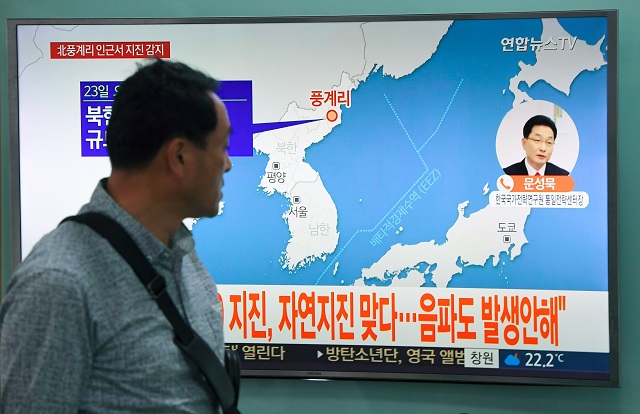
It came after days of increasingly bellicose rhetoric between US President Donald Trump and North Korean leader Kim Jong-Un's regime, as international alarm mounts over Pyongyang's nuclear ambitions.
The United States Geological Survey (USGS) said the quake struck around 20 kilometres away from the North's nuclear test site, where earlier this month Pyongyang detonated its sixth and largest device, which it claimed to be a hydrogen bomb capable of being launched onto a missile.
"This event occurred in the area of the previous North Korean Nuclear tests. We cannot conclusively confirm at this time the nature (natural or human-made) of the event. The depth is poorly constrained and has been held to 5 km by the seismologist," USGS said in a statement.
Russia at UN slams 'military hysteria' over North Korea
Regional experts differed on their analysis of the tremor, with the China Earthquake Network Centre (CENC) service calling it a "suspected explosion" while Seoul's Korea Meteorological Agency (KMA) judged it a "natural quake".
"There is no possibility that this could be an artificial quake," Yonhap news agency quoted a KMA official as saying.
The North's last test, on September 3, was the country's most powerful detonation, triggering a much stronger 6.3-magnitude quake that was felt across the border in China.
A second tremor soon after that test was possibly caused by a "cave-in", CENC said at the time.
The test prompted global condemnation, leading the United Nations Security Council to unanimously adopt new sanctions that include restrictions on oil shipments.
A UN-backed monitoring group said analysts were investigating Saturday's quake.
Lassina Zerbo, executive secretary of the Comprehensive Nuclear Test Ban Treaty Organisation (CTBTO), tweeted that the quake was "unlikely Man-made! Similar to "collapse" event 8.5 mins after DPRK6", a reference to the second tremor that followed the September 3 test.
Two #Seismic Events! 0829UTC & much smaller @ 0443UTC unlikely Man-made! Similar to "collapse" event 8.5 mins after DPRK6! Analysis ongoing pic.twitter.com/DXaDn8TZOf
— Lassina Zerbo (@SinaZerbo) September 23, 2017
The strength of the quake was much lower than the tremors registered during any of North Korea's nuclear tests, including its first detonation in 2006, which triggered a 4.1-magnitude quake.
Social media users in China said they "felt nothing" when Saturday's quake hit, compared to the September 3 tremor.
Russia's weather forecasting service said that radiation levels were normal following the quake, according to a report by the Interfax news agency.
The quake came at the end of a week that saw a blistering war of words between Kim and Trump, with the US leader using his maiden speech at the UN General Assembly to warn that Washington would "totally destroy" the North if America or its allies were threatened.
The North, which says it needs nuclear weapons to protect itself against the threat of invasion by a hostile US, responded on Friday with a rare personal rebuke from Kim, who called Trump "mentally deranged" and a "dotard" and threatened the "highest level of hard-line countermeasure in history".
Washington announced tougher restrictions Friday aimed at curbing North Korea's nuclear and ballistic missile programme, building on tough new UN sanctions aimed at choking Pyongyang of cash.
Russia and China have both appealed for an end to the escalating rhetoric between Washington and Pyongyang.
But on the fringes of the UN meeting this week, North Korean Foreign Minister Ri Yong-ho upped the tensions further, telling reporters Pyongyang might now consider detonating a hydrogen bomb outside its territory.
North Korea launches missile over Japan
Monitoring groups estimate that the nuclear test conducted in North Korea earlier this month had a yield of 250 kilotons, which is 16 times the size of the US bomb that destroyed Hiroshima in 1945.
Hydrogen bombs, or H-bombs, are thermonuclear weapons far more powerful than ordinary fission-based atomic bombs, and use a nuclear blast to generate the intense temperatures required for fusion to take place.

















COMMENTS
Comments are moderated and generally will be posted if they are on-topic and not abusive.
For more information, please see our Comments FAQ